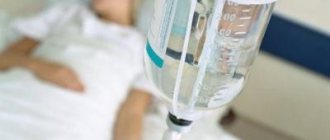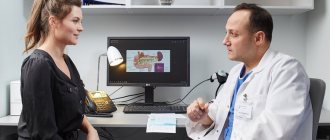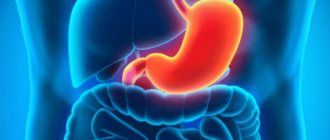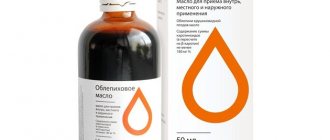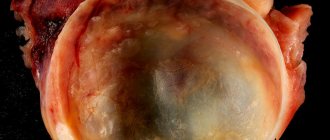Recently, problems with the gastrointestinal tract have become the most common diseases. Gastroenterology is a branch of medicine that studies the 30 organs included in the gastrointestinal tract, their functioning and methods of treatment. This science also includes three subsections:
1) Coloproctology
2) Proctology
3) Hepatology
A specialist involved in this field is called a gastroenterologist. He deals with the problems of all digestive organs: small and large intestines, pancreas, gall bladder and stomach, liver and esophagus. Doctors with a more narrow specialization are called hepatologist (liver, gallbladder, ducts), coloproctologist (large intestine). A doctor who deals with oncological problems of the gastrointestinal tract is called an oncologist.
What kind of disease is this
Acute gastritis is a severe inflammation of the gastric mucosa caused by exposure to external irritants. The disease is acute, but if left untreated it becomes chronic. Factors influencing the manifestation of pathology are the ingestion of chemicals into the stomach, overdose of non-steroidal drugs, and consumption of food contaminated with microorganisms. Acute gastritis is divided into several types:
- catarrhal - relatively mild inflammation;
- erosive - caused by the appearance of ulcers on the mucous membrane;
- hemorrhagic - characterized by erosive bleeding;
- atrophic - death of individual stomach tissues.
When tissue structures atrophy, scars form. If this pathology is not treated, stomach cancer gradually develops. Provocateurs of an outbreak of acute gastritis can be:
- damage to the stomach by the bacterium Helicobacter pylori;
- long-term use of medications;
- stress overexertion;
- reflux - reflux of the contents of the duodenum into the stomach;
- toxic and alcohol poisoning;
- poor nutrition;
- metabolic disease;
- chronic infections;
- diseases of the digestive system;
- genetic predisposition.
Helicobacter pylori infection is one of the main causes of gastritis. The bacteria is transmitted through shaking hands, kissing, and eating utensils. For several years in a row, a person is its carrier, but the processes of development of pathological disorders immediately begin in the stomach.
What is gastroscopy and why is it needed?
If you haven't had a gastroscopy in a while, you will most likely still have to undergo one. The procedure is not pleasant, but if you come to the clinic with a positive attitude and properly prepare for gastroscopy, everything will be fine.
How it's done?
The doctor inserts the endoscope through the mouth into the esophagus, stomach and duodenum. On the screen, he sees a clear image that allows him to carefully examine the walls of the internal organs and, if necessary, take material for a biopsy.
Compared with x-rays, gastroscopy has a number of advantages. First of all, this:
- High information content.
- No X-ray radiation.
- Quick results.
- Possibility of additional manipulations (histology, cytology, determination of acidity, removal of polyps and neoplasms, administration of medication).
Indications for this procedure are an ulcer, an inflammatory process, a tumor in the esophagus, stomach, upper small intestine (or suspicion of them), reflux disease.
Symptoms
Symptoms of acute gastritis arise due to uncoordinated work of different parts of the stomach:
spontaneous pain in the epigastric zone before or after eating;- constant heartburn;
- belching sour;
- bad breath;
- nausea;
- vomiting stomach acid;
- decreased appetite;
- feeling of rapid filling of the stomach.
With acute gastritis, people experience the same symptoms as with functional dyspepsia. However, there is inflammation in the gastric mucosa. Therefore, do not hesitate, seek medical help.
Symptoms
The nature of abdominal pain varies. The discomfort can be cutting, girdles, pulling, burning, stabbing, cramping, occur periodically or be permanent. At the appointment, the doctor first interviews the patient and asks him to describe the unpleasant symptom. Often the pain is so severe that the patient does not notice other symptoms, for example:
temperature rise,- decrease or increase in blood pressure,
- hardening of the abdomen and tension of the peritoneal muscles,
- shortness of breath,
- sour belching
- general weakness, fatigue, lethargy,
- increasing abdominal volume,
- nausea,
- weight loss and exhaustion,
- changes in skin color,
- bowel disorders.
In this case, you should not hesitate to visit a doctor. If attacks of pain occur rarely and last no more than a minute, then a preventive consultation is required.
Diagnostics
The examination begins with a survey of the patient's complaints. The patient talks in detail about the symptoms of the disease, when the first signs appeared, and how long the pain lasts. The patient then undergoes clinical tests of blood, urine and stool. If you need to take other tests, the doctor will make an appropriate appointment.
The main method for diagnosing acute gastritis is gastroscopy. The technique allows you to visualize inflammation of the mucous membrane and other deficiencies of the digestive system. The procedure is performed in a position lying on your side. A thin gastroendoscope tube is inserted into the patient's mouth, after wetting the mouth with an anesthetic solution. The device is lowered down the esophagus into the stomach, and the image is displayed on the monitor screen. This way the gastroenterologist has the opportunity to see what is happening in the organ being studied.
Gastroscopy is performed with an advanced Japanese endoscope with the thinnest tube. The equipment is state-of-the-art, so the patient will not feel pain. For hypersensitive patients, local anesthesia is used, and the session is carried out “in their sleep”. Kuntsevo is famous for its safe and painless procedures.
Additional diagnostic tools are used if the doctor doubts the accuracy of the diagnosis. An abdominal ultrasound and magnetic resonance imaging may be prescribed. If gastritis has become chronic, a study of internal secretion is carried out and a piece of the gastric mucosa is taken for biopsy. These manipulations are performed during gastroscopy.
What diseases does a gastroenterologist treat?
A gastroenterologist deals with a wide range of problems: gastritis, intestinal ulcers, enlarged esophageal veins (varicose veins), hernias and polyps, cholecystitis and cirrhosis of the liver. The doctor, having studied the anatomy of your gastrointestinal tract, identifies digestive problems, creates a therapeutic diet, and prescribes medications for recovery. When working with newborns, the doctor treats colic and eliminates dysbiosis. Before you finally decide to work as a gastroenterologist, you need to fully review the list of responsibilities. These include consultations, appointments in clinics, and treatment of patients in hospitals. Conducting periodic examinations, analyzing the results and diagnosing diseases, preventive examinations. Don’t forget about paperwork: daily documentation, issuing necessary prescriptions, filing sick leave.
Treatment
The attack is usually relieved with antispasmodics. Then, depending on the cause of acute gastritis, treatment with medications is prescribed - prokinetics, antacids, proton pump inhibitors, antibacterial, anti-inflammatory, antisecretory drugs. Medicines should be taken for up to 3 weeks, or more precisely, the attending physician will tell you.
The main thing in the treatment of acute gastritis is diet. The Kuntsevo Medical Center has its own nutritionists who will develop a balanced nutrition program. During an exacerbation, it is better to refuse food altogether. Drink as much pure water (still) as possible. Next, we exclude marinades, pickles, and spicy dishes. We eat pureed soups and pureed light products. You should not drink strong tea, coffee, or cocoa. The drink should be warm so as not to irritate the stomach.
The main thing is not to self-medicate! A complication of the disease is stomach cancer, which progresses slowly and is practically asymptomatic.
Which doctor treats abdominal pain
If you have any discomfort in your stomach, you need to make an appointment with a gastroenterologist. Depending on the situation, the doctor will order an examination and determine the diagnosis, and if necessary, refer you to another specialist. At the Kuntsevsky Treatment and Rehabilitation Center, admission is by appointment.
To make an appointment, choose any method:
- call the clinic +7 (495) 103-99-55,
- order a call back,
- leave a request for an appointment using a convenient form on the website:
SIGN UP
The result of treatment and lifestyle after recovery
The effectiveness of therapy depends on the individual characteristics of the patient and the form of acute gastritis. The patient is recommended to take medications for approximately 3 weeks. The discontinuation of medications should be done by the attending physician. During this period and after it, follow a diet. If you have an attack of acute gastritis, the pathology may return. To monitor the effectiveness of treatment, a repeat gastroscopy and a Helicobacter test are performed (a special blood test is taken). For chronic gastritis, regularly visit a gastroenterologist 2 times a year.
After recovery, take care of yourself:
- eat rationally;
- get rid of heavy physical activity;
- give up bad habits;
- legalize the work and rest regime;
- avoid stress;
- walk in the fresh air more often;
- play sports.
The Kuntsevo Medical Center has its own physical therapy room. Light exercises under the supervision of professional instructors will have a beneficial effect on the functioning of the gastrointestinal tract.
Is it possible to undergo a comprehensive examination in one place?
We offer everyone who cares about their own health, but wants to save time and money, to undergo a comprehensive examination, or Check-Up, of the stomach.
As part of the screening you:
- Consult a gastroenterologist.
- You will undergo FEGDS, Helicobacter pylori test and acidity determination.
- Get tested (complete blood count + ESR, biochemistry 7 indicators, stool examination for protozoa and Giardia cysts using enrichment method).
The cost of a comprehensive examination is 5,990 rubles (savings – 600 rubles).
Why is it better to seek treatment from us?
The clinic's staff includes gastroenterologists of the highest category and doctors of medical sciences. When you come to us with acute gastritis, you can be sure that you will not only receive high-quality medical care, but also get everything done in one place: diagnosis, treatment and rehabilitation! Our center uses highly efficient equipment and devices manufactured using the latest technologies. Sterile rooms and friendly staff will not leave you indifferent. The main thing in our work is an individual approach to clients! Make an appointment at a great price. Call!
The contents of this article have been checked and confirmed for compliance with medical standards by gastroenterologist-nutritionist Tatyana Vladimirovna Lucheninova
Why you need to treat abdominal pain with us
One of the difficult tasks is diagnosis. Establishing a diagnosis requires special professionalism and experience. At the clinic near the Molodezhnaya metro station in Moscow, qualified gastroenterologists are seen, whose clinical experience allows them to identify the disease in time. Our center is equipped with the latest equipment that helps determine the cause of abdominal pain. Doctors regularly study new treatment methods abroad and, based on the data obtained, provide medical care, develop a treatment plan and subsequent recovery.
Treatment of stomach pain
We have listed only a small part of the diseases that manifest themselves as stomach pain. Whatever the cause of discomfort, it is not recommended to relieve the pain syndrome on your own. The diseases are serious and can cause unwanted complications, especially if you take painkillers and forget about treatment. In addition, taking medications can make diagnosis difficult. Do not wait for your condition to worsen, contact a specialist before delay becomes fatal.
Do not forget to tell the specialist what you have eaten recently, what medications you have taken, whether you have felt nausea, bitterness in your mouth, bloating, etc. You should also inform the doctor about any illnesses you have suffered recently and changes in your health.
Based on a story about your symptoms and an external examination, even an experienced doctor will not always be able to make a diagnosis. Therefore, the gastroenterologist will definitely write out directions for laboratory tests, and, possibly, for gastroscopy or ultrasound of the stomach. Thus, gastroscopy makes it possible to assess the picture of the disease visually and make the most accurate diagnosis.
Symptoms of pancreatic pathology
A gastroenterologist treats diseases of the gastrointestinal tract
The most common disease of the pancreas is pancreatitis, an inflammation that gradually leads to tissue degeneration. Pancreatitis can be either acute, sudden onset, or chronic. The causes of pancreatitis are:
- poor nutrition
- alcohol
- a number of diseases of the digestive tract (for example, cholelithiasis)
- injuries
- complications after infections
- taking strong medications.
General symptoms of pathology:
- pain in the left hypochondrium (both associated and not associated with eating)
- lack of appetite
- nausea (sometimes vomiting)
- flatulence and bloating
- bowel problems (diarrhea or constipation)
The severity of the described symptoms depends on the degree of developed pathology, however, even in the initial stage of the disease, the body will not have enough nutrients, and despite good nutrition, the patient experiences weight loss, vitamin deficiency, brittle nails and dry skin.
Diseases of the abdominal organs, what hurts?
Diseases of the abdominal cavity are very diverse, each of them has its own symptoms, treatment methods and danger for the patient. For diagnosis it is necessary to do an ultrasound of the abdominal cavity. Some of these diseases are discussed below.
Inflammation of the appendix of the cecum (appendicitis)
Acute appendicitis is one of the most common diseases of the abdominal cavity. Symptoms of appendicitis are pain in the umbilical and right iliac region of the abdomen. The patient may experience nausea and vomiting. Sometimes pus may accumulate in the appendix and perforate into the abdominal cavity. Treatment is appendectomy (surgery to remove the appendix).
Exacerbation of stomach ulcers
Perforation of a stomach ulcer occurs due to the erosion of the stomach walls by gastric juice, resulting in the entire contents of the stomach ending up in the abdominal cavity. In this case, the patient experiences acute convulsive pain in the epigastric region. After this, a powerful contraction of the abdominal wall muscles occurs. The patient may lose consciousness or go into shock. Treatment is emergency surgery. The most common option is suturing the ulcer.
Peritonitis
Intestinal obstruction develops as a result of strangulation of the bend of the intestinal loop or due to intestinal volvulus. In this case, the muscles of the abdominal wall are in a contracted state, resulting in:
- acute abdominal pain and vomiting;
- there is bloating;
- asymmetry of the abdomen occurs;
Primary surgical treatment at AndroMed is carried out only in the presence of peritonitis. In other cases, they first resort to conservative methods of treatment, which are aimed at overcoming hyperperistalsis, intoxication and disruption of homeostasis.
We can consider the treatment effective if peristalsis is normalized, abdominal bloating is eliminated, and the barium contrast mixture moves through the digestive tract from the small to the large intestine. If conservative treatment does not bring results, our surgeons proceed to surgical methods: they perform laparotomy and revision of the abdominal cavity, during which the viability of the intestine is determined (the pink color of its serous membrane, peristalsis and pulsation of blood vessels). Non-viable areas are removed surgically.
Urolithiasis (nephrolithiasis)
Urolithiasis (nephrolithiasis) develops as a result of the formation of kidney stones. The nature of the origin of these stones can be different - a violation of metabolic processes, infectious diseases of the urinary tract, a violation of the passage of urine. The attack is characterized by acute painful spasms in the lumbar region and nausea with vomiting (renal colic). Hematuria is also possible - the presence of blood in the urine in excess of the physiological norm. During an attack, analgesics and antispasmodics are used for treatment. For complete cure (depending on the type of stones), AndroMed uses the surgical method, lithotripsy (destruction of stones using shock waves) and litholysis (dissolution of certain types of stones by taking pharmacological drugs).
Gallstone disease (cholecystitis, cholelithiasis), exacerbation
Gallstone disease (cholelithiasis) is the formation of stones in the gallbladder. Gallstones (the main cause of pain) are formed from elements of bile, most of which are dominated by cholesterol. The first manifestations of the disease begin after 5-10 years and consist of attacks of biliary colic. The pain is stabbing and cutting, radiating to the right shoulder blade, right forearm or lower back. Sometimes stones may not cause any discomfort at all and may be accidentally discovered as a result of ultrasound or radiography, which are the main methods for diagnosing this disease. Treatment using ultrasound methods is not very effective because most gallstones are highly durable. The most proven and effective treatment method is cholecystectomy - removal of the gallbladder. Regarding this operation, you can contact the surgeons of the AndroMeda clinic.
Acute pancreatitis
With pancreatitis, there is a release of pancreatic enzymes not into the duodenum, but into the gland itself, as a result of which it is destroyed. Symptoms: acute sudden pain in the stomach radiating to the left half of the body, vomiting mixed with bile, obstructive jaundice. Treatment at AndroMed, in most cases, is carried out with the help of a special diet and medications.
Exacerbation of gastritis
Gastritis is inflammatory or dystrophic pathological changes in the gastric mucosa. It can develop as a result of bacterial damage, stress, imbalanced nutrition, exposure to chemical factors and radiation, and bad habits. Symptoms of gastritis - common manifestations of dyspepsia:
- heaviness in the stomach;
- nausea;
- regurgitation;
- unpleasant taste in the mouth;
- heartburn;
- as well as weakness;
- irritability;
- fast fatiguability.
Treatment of gastritis at AndroMed is carried out on an outpatient basis with the help of medications.
Abdominal diseases also include exacerbations of chronic enteritis and colitis. These pathological conditions are characterized by a feeling of heaviness, bloating and rumbling in the abdomen, pain in the small and large intestines, respectively. Complex therapy of these diseases at the AndroMeda clinic guarantees recovery.
Strangulated hernia
A dangerous condition is a strangulated hernia. It can be congenital, acquired or postoperative in nature. Depending on its location, nausea and vomiting, abdominal pain, and heart rate increase. In the area of pain, a dense, painful, unreducible formation is identified. Treatment is carried out only in the surgical department, so at the first symptoms you should contact our surgeon. You should not attempt treatment on your own or hesitate to call an ambulance, as this can lead to intestinal necrosis.
Hepatitis
Hepatitis combines inflammatory changes in the liver. Symptoms of the disease are fatigue, jaundice, pain in the right hypochondrium. With viral hepatitis, symptoms similar to the flu are possible: fever, aches, and general malaise. You can undergo complex treatment of hepatitis in our clinic.
